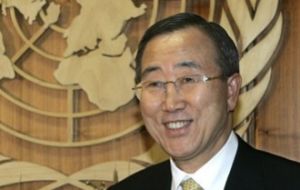MercoPress. South Atlantic News Agency
UN calls on G-24 for pragmatic approach to self determination
 Ban: “Decolonization must take in to account specific circumstances of each territory”
Ban: “Decolonization must take in to account specific circumstances of each territory” With 16 Non-Self-Governing Territories still remaining, the United Nations must step up its decolonization efforts, Secretary-General Ban Ki-moon said, calling for greater cooperation between these areas and administering countries.
At the time of the UN's establishment in 1945, 750 million people – almost one-third of the global population – lived in non-self-governing territories, compared to fewer than 2 million today. "The United Nations can look back with a great sense of accomplishment at what has been achieved in the field of decolonization since the Organization's founding," Mr. Ban said in an address on 27 February at the start of this year's session of the body formally known as the Special Committee on the Situation with Regard to the Implementation of the Granting of the Independence to Colonial Countries and Peoples. Decolonization "is an unfinished process that has been with the international community for too long," he said in a message delivered by Muhammad Shaaban, Under-Secretary-General for General Assembly Affairs and Conference Management. In the last two years of the Second International Decade for the Eradication of Colonialism, Mr. Ban called for the acceleration of the UN's work to "achieve concrete results." He told the body, also known as the Special Committee of 24, to continue its support of the "legitimate aspirations of the people of Non-Self-Governing Territories so they can exercise their right to self-determination." "The Special Committee must continue to support the legitimate aspirations of the peoples of the Non-Self-Governing Territories so they can exercise their right to self-determination. To help those Territories achieve this in a manner that fulfils the requirements of the Charter and the General Assembly's 1960 Declaration on Decolonization, I encourage you to continue to pursue a pragmatic and realistic approach, taking into account the specific circumstances of each Territory". "A successful, meaningful and productive decolonization process cannot take place without close cooperation between the administering Powers and the Territories". "Under the Charter, the administering Powers have a special obligation to bring the Territories under their administration to an appropriate level of self-government. I hope the administering Powers will work together with the Special Committee and the people in the Territories to find the appropriate format and timing for the completion of decolonization in each Territory". The Secretary-General cited the example of New Zealand and Tokelau in promotion decolonization. In 2007, after UN-supervised referendum fell 16 votes short of attaining self-government, it was decided that the territory of Tokelau – three small and isolated atolls in the Pacific Ocean – would remain a territory of New Zealand. "Under the [UN] Charter, the administering Powers have a special obligation to bring the territories under their administration to an appropriate level of self-government," he added. The Secretary finally said that in these last two years of the Second International Decade for Eradication of Colonialism, proclaimed by the General Assembly to run from 2001 to 2010, "we need to accelerate our work to achieve concrete results in the decolonization process. And we need to bring our collective efforts to a successful conclusion".




Top Comments
Disclaimer & comment rulesCommenting for this story is now closed.
If you have a Facebook account, become a fan and comment on our Facebook Page!